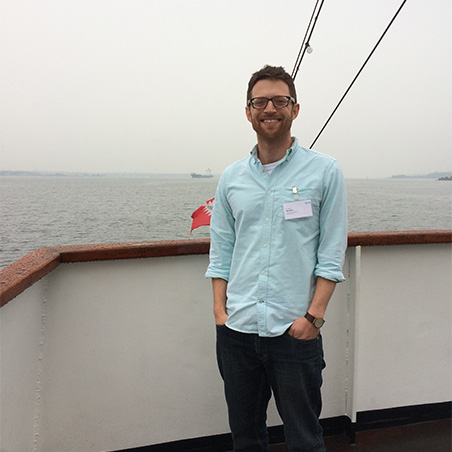David Herbert
Assistant Professor, Department of Chemistry at the University of Manitoba
Bachelor of Science (Hons.), Chemistry, 2004
I definitely was not one of those kids who had a science kit and blew up the garage.
Take a stroll through David Herbert’s lab in the Department of Chemistry at the University of Manitoba in Winnipeg (wearing safety glasses, of course) and you’ll be walking through the playground of a synthetic chemist. You’ll spot an X-ray diffractometer, bubbling flasks and stirring solutions. You might also see a state-of-the-art CVD set-up, and all sorts of other high-tech equipment that David and his team use to make and study new molecules.
“I’m in it because it’s fun,” he says with the kind of passion and delight you would expect of someone who has found his dream job.
“I have a lab, and if I can get the funding, I can do whatever I want, whatever I find interesting. One of the selling points I use when I try to convince people to consider graduate school is: This is a remarkable opportunity. When are you ever given five years to just experiment, literally experiment?”
David hadn’t always been specifically interested in chemistry. “I definitely was not one of those kids who had a science kit and blew up the garage,” he says. When he finished high school he came to King’s. “I chose FYP Science (Foundation Year Program, science stream) because I was attracted to the balance between “arts” and “science”. In high school, I enjoyed philosophy-style classes because you got to voice your opinion, but I also liked science because it was very real and resonated in a way that I thought was important.” Despite being an honours chemistry student, David continued taking classes at King’s in the Contemporary Studies Program and History of Science and Technology with King’s luminaries including Peggy Heller and Steve Snobelen, helping him develop what he looks on now as important perspective on his current research.
David says, “Part of the King’s experience is you start to see the value in thinking about the structure and genealogy of ideas. It’s not necessarily something that’s routinely done in contemporary science research – considering how we came to know the things we know. Overall though, in the lab, it’s the little riddles that are the best. And when you get to the end of one, it may be something totally pedantic but you’ve untangled that knot. That’s the real fun of it.”
But it’s also that some of his work has the potential to make a difference, to help curb climate change.
“One of the main areas we are working on is looking at how to remediate carbon dioxide, how to turn it back into liquid fuel so it can be used for combustion.” That could turn into a technology that would help reduce the amount of carbon dioxide introduced into the atmosphere from burning fossil fuels. “You’re trying to balance the ledger,” he says “getting to a carbon neutral cycle.”
David believes it could be a bridging technology, a stop on the road to a complete shift to clean energy. But it will be a long process that involves creating new molecules, discovering what they can do, how stable they are, and whether they will be useful. It is, for David, a great mix of fundamental and applied research that is as much about the journey as it is about the destination.
“It’s not necessarily making a specific discovery but more so the fun of being in the dark at first and then seeing things come together in a moment of clarity.”
It really is his dream job.
Posted: June 2017
 Connect with David Herbert
Connect with David Herbert